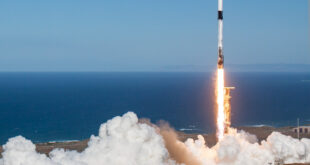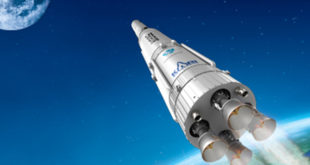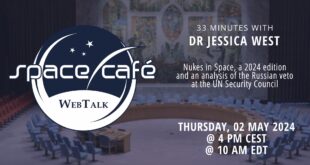by Christophe Bosquillon

Two major space events took place in South-Korea in November 2023: Space Forum Korea, hosted by the South-Korean government, in close cooperation with the US and major ASEAN economies. And an International Workshop on Space Resources with Perspectives of Emerging Space Programs, hosted by the Secure World Foundation, an American NGO. Then, on the first day of December 2023, a SpaceX Falcon 9 rocket launched the country’s first spy satellite into orbit, from California’s Vandenberg Space Force base, just one month after North Korea had launched its own. Let’s review these events in context, and draw some observations on the global standing of South-Korea as an Emerging Space Country.
Space Forum Korea, hosted by the South-Korean government.
Space Forum Korea took place on 08-09 November 2023 under the banner “Challenge and International Cooperation to Create New value in the Space Economy”. An 8-hour video of the event , mostly in Korean, is available under the title “[Korea Space Forum 2023] A new space age is coming! Space economy, space industry, and international cooperation.” Space Forum Korea was hosted by the Ministry of Science and ICT and put together by five organizations that form the backbone of South-Korean space domain activities: the Korea Association for Space Technology Promotion (KASP); the Korea Aerospace Research Institute (KARI) ; the Korea Astronomy and Space Science Institute; the Space Policy Research Center (SPREC) ; and the Korea Testing Laboratory (KTL). SPREC is a space policy think tank established in the Science and Technology Policy Institute (STEPI) as a project supported by the Ministry of Science and ICT in August 2021.
The first day consisted of a “South-Korea – US space symposium”, showcasing about a dozen panelists for each country. The discussion focused primarily on government support structures, supply chain resilience, and partnerships for commercial space exploration, and concluded with an action plan for an improved South-Korea – US cooperation in the space domain.
The second day focused on the creation and utilization of ‘New Space Industries’ to revitalize space cooperation internationally. What that means is that South-Korea will further expand in satellites markets and related business platforms, while integrating all downstream verticals for essential Earth Observation data markets. The country will do so through engagement with Thailand (GISTDA) and Malaysia (MYSA), which intervened as ASEAN panelists. Singapore and the Philippines were also mentioned. Mexico (Agencia Espacial Mexicana) participated as non-ASEAN partner in the panel.
One South-Korean participant presented a case study of penetrating overseas markets using satellite contents. Another panelist discussed plans to launch a space startup in Seoul and enter the domestic market. Back in May 2023, South Korea had placed a mission-capable satellite into orbit, using for the first time in its history its own domestically produced Nuri rocket. Panelists emphasized the importance of space utilization in strengthening the economy and encouraged other domestic startups to launch domestically with Nuri rockets to open new opportunities for the national space industry.
Importance of the lunar economy for South-Korea
South-Korea is an Artemis participant keen on lunar exploration on its own terms. Panel 4 of the first day focused on ‘Partnerships to Enable Commercial LEO Destinations and Lunar Exploration’. This panel covered the topic of lunar bases through international cooperation, including space activity regulations, export controls, liability and indemnification, and intellectual property. KARI led the way by developing the country’s first lunar mission, KPLO, Korea Pathfinder Lunar Orbiter, aka Danuri, which is currently orbiting around the Moon. KARI is also preparing for its first lunar lander mission scheduled for launch in 2032. KARI houses spacecraft assembly, integration, and testing (AIT) facilities and ground stations, with a control room from which KPLO is operated. KARI further demonstrated its ability as the host of the main event of the 2023 International Moon Day at the Korea National Science Museum in Gwacheon. And indeed, the lunar economy was about to take center stage with the Secure World Foundation space resources Workshop in late November 2023.
International Workshop on Space Resources
The International Workshop on Space Resources, with Perspectives of Emerging Space Programs, took place from 29 November to 01 December 2023 in Daejeon. A program is available here. While the workshop title said “space”, it was clearly about lunar resources.
This workshop was co-organized with KARI, KIGAM, and KICT. We already mentioned KARI’s role in lunar activities, let’s review the other two. The research conducted by KIGAM, the Korea Institute of Geosciences and Mineral Resources, includes geology and space, mineral resources, resource utilization, climate change response, marine geology and energy, and geologic hazards. Established in January 2023, the Space Resource Exploration and Utilization Center (SREUC) is investigating lunar geology and resources using the KPLO Gamma Ray Spectrometer (GRS) and has the vision of exploring space mineral resources (SWGL reported on it in its coverage of Space Resources Week 2023 here and here. As for KICT, the Korea Institute of Civil Engineering and Building Technology, it has expanded its research into space construction since 2016. With focus on the lunar construction, it developed facilities and control technologies for testing lunar surface environment. It has showcased the large size Dusty Thermal Vacuum Chamber (DTVC) that simulates the lunar environment with simulants. KICT also conducts R&D on local site survey and drilling exploration and construction using in-situ materials.
The Workshop timing coincided with Korea’s hosting of the ISECG meeting. It aimed to establish information-sharing links between the space resource community and the new entrant space exploration community. Presentations on the science, technology, business, and policy aspects of space resources, provided the audience with a comprehensive view of the issues behind the development of space resources. The speaker’s lineup was a gathering of well-known space resources utilization experts and lunar activities practitioners, who were joined by representatives of space agencies such as AEB, AEM, CSIRO, CSA, ESA, JAXA, KARI, LSA, POLSA, etc. Discussions focused on effectively engaging the new entrant space exploration programs so that they can contribute to and benefit from space resource activities in the coming future. The workshop concluded with a program design simulation exercise, that aimed at considering the different objectives, benefits, and challenges in building a cooperative space resources utilization project between established agencies, new entrant programs, and commercial actors.
Space and South-Korean national security
The end of World War 2 in August 1945 marked the end of the annexation and occupation of the Korean Peninsula by Japan, that had gone undisrupted since 1910. The 1950-1953 Korean War ended up in the partition of the Peninsula between the North (Democratic People’s Republic of Korea – DPRK) and the South (Republic of Korea – ROK). The 1962-1980 rapid economic growth of South Korea after the war had ended was coined “The Miracle on the Han River”. The 1988 Olympics Games in Seoul took place as a rite of passage and admission of the country into the club of the world most economically, industrially, and technologically advanced nations.
Yet, strategically, and militarily, South-Korea has remained highly dependent on the US for its security, since the aggravated status of the Peninsula remains a major security concern for the region and the world. On 13 November 2023, the US Department of Defense released a note titled ‘Defense Vision of the U.S.-ROK Alliance’ that further solidifies an alliance that “has successfully deterred conflict on the Korean Peninsula for 70 years”. The question of whether South-Korea should be characterized as a “Middle Power” or a “Protectorate” is regularly debated among pundits.
On 01 December 2023, from the California Vandenberg US Space Force base, a Falcon 9 rocket launched the first of five spy satellites that South Korea plans to send into space by 2025 under a contract with SpaceX. As reported by Nikkei Asia, ““With this successful launch of the military satellite, our military has secured independent intelligence, surveillance and reconnaissance capabilities,” South Korea’s defense ministry said in a statement, adding that the South Korean military is also developing a microsatellite system project for rapid monitoring and early warning. The ministry added that it would maximize the capabilities of its independent surveillance and reconnaissance assets to gain an overwhelming advantage in competition with North Korea. »
In both the civilian and defense fields, the foray that the country has been conducting in the space domain cannot be denied nor downplayed. The Korea Space Forum had further stressed that while major space-faring countries like the United States and China play an important role in space exploration, smaller nations also have a chance to participate and contribute to the field. The SWF workshop comprehensively reviewed the modalities of such engagements. Even if South-Korea may currently not be as advanced in space as Japan, China, and India are, the country is positioned to act as a serious regional competitor and a global space game changer. South-Korea has arrived as an Emerging Space Power, and before this decade is over, the country will likely be considered as a fully realized space power. This will have a positive impact as well on the country’s national security.
Considering the unimaginable suffering that the Korean people have had to endure, during their centuries-long history of being, not unlike Poland, invaded and trampled over by more powerful neighbors, the enduring dignity of this great nation will see it through becoming a truly recognized actor in the space domain. With the orbital, cislunar, and Moon economy within its sights, this latest development for South Korea might not fall short of being called “The Miracle on the Han River 2.0.”

Christophe Bosquillon has a diverse professional background, having operated globally with a focus on the Indo-Pacific region. His experiences in Japan, the Koreas, Taiwan, China, ASEAN, India, Russia, and Australia have given him a deep understanding of the multipolar realpolitik of our world under the Pax Americana. With a background in engineering, trade, and foreign direct investment in industries relevant to Space Resource Utilization (SRU), such as mining, transportation, energy, manufacturing, agrifood, environment, and digitalization, Chris is committed to developing SRU value chains that benefit the Earth. As an executive, owner, writer, and founder of Autonomous Space Futures Ltd, Chris has extensive experience in collaborative policy crafting and works to develop space business and governance models relevant to society. He is a member of NGOs that provide input to the United Nations Committee on the Peaceful Uses of Outer Space (UNCOPUOS) legal subcommittee Working Group on Space Resources. Chris contributes to regulatory clarity on appropriation, priority, sustainability, and sharing in a way that balances national interests with civil society inclusion, provided a transparent due process is followed. When advocating for access to technology and space for the Global South, Chris believes that emerging space powers’ participation in space markets must be commensurate with their interest and involvement in international space politics. He believes that their ability to develop sovereign domestic capabilities with spillover potential is also essential. Chris is keen on ‘Peace Through Strength’ diplomacy and deterrence-based security as enablers of secure space access. He supports sovereign cislunar space situational awareness as mandatory for freedom of circulation in the space domain and deconflicted cooperation on the Moon.





